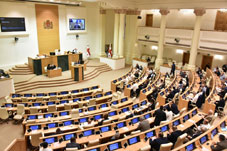
An anti-corruption service may be set up in Georgia
By Natalia Kochiashvili
Wednesday, September 2
Independent MPs Tamar Chugoshvili, Dimitri Tskitishvili, and Irina Pruidze have introduced new anti-corruption legislation to the parliament. According to Chugoshvili, the submitted document consists of several hundred pages and envisages 3 directions in the fight against corruption: Corruption Crime Investigation; Control over the financing of political parties; Monitoring of property declarations of officials.
According to Chugoshvili, to fight corruption effectively, it is necessary to have an independent anti-corruption institution in the country. The MP says that the submitted bill envisages the creation of such an institution, the “National Anti-Corruption Agency.”
“Anti-corruption institutions must be completely independent, have high legitimacy and all 3 issues - political funding, corruption investigation, and control of officials; income declarations - must be carried out by an independent institution,” Chugoshvili said.
Chugoshvili says that the problems related to corruption in Georgia are mentioned in the European Parliament resolutions, as well as in the statements of the congressmen and the bills supported by the House of Representatives. Accordingly, the legislative process related to the initiated law will be actively monitored by international partners.
Another initiator of the bill, Tskitishvili, speaks about the importance of an independent anti-corruption institute. He said the new bill would significantly improve the situation in the fight against corruption.
The international publication Bellingcat published an article on the deterioration of the corruption situation in Georgia on August 1. The article reviews the possible facts of corruption by the Georgian authorities during the Covid-19 pandemic.
Adoption of the amendments is also supported by Transparency International Georgia (TIG), which states that to fight corruption, it is necessary to have an accountable body to the Parliament, which will carry out extensive monitoring of corruption risks.
TIG stated that the proposed model had proved to be effective in various European countries and would provide an effective mechanism to deal with the cases of “elite corruption” in Georgia. The watchdog called on the Georgian MPs to support the bill to help fundamentally strengthen the anti-corruption environment of Georgia.
The agency will be accountable to Parliament and will have investigative powers. The head of the agency is appointed by the parliament with a high quorum, which ensures a high degree of political impartiality.
The agency has several anti-corruption functions that are currently scattered in various agencies (State Security Service, Civil Service Bureau, and State Audit Office) or are not assigned to any agency at all: Control over the implementation of the anti-corruption legislation of Georgia and refinement of the anti-corruption policy; Detect, investigate and prevent corruption in public institutions. Also, implementation of corruption prevention measures; Monitoring the property declarations of officials; Monitoring the financial activities of political parties; Protection of whistleblowers; Ensuring the fulfillment of international anti-corruption obligations by the Georgian authorities, etc.
According to the authors of the bill, the establishment of a new agency will cost up to GEL10 million.


